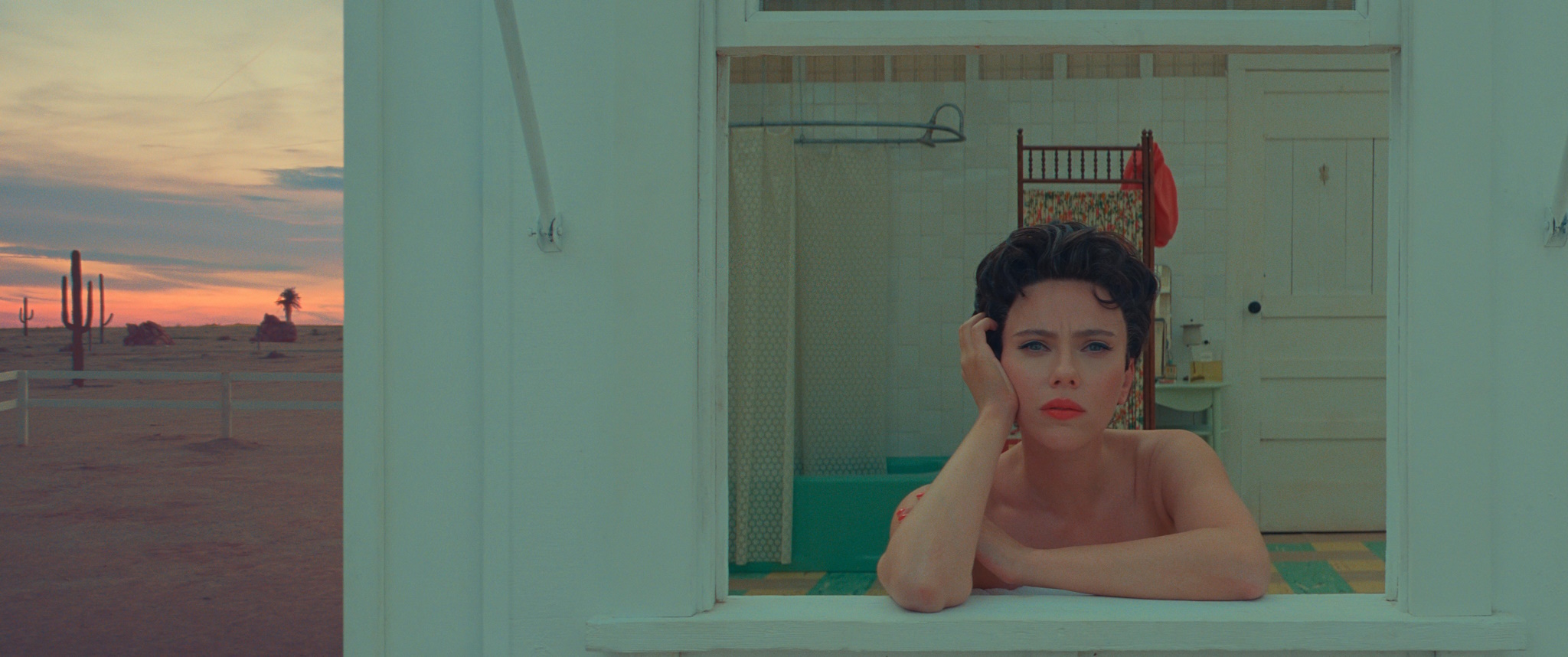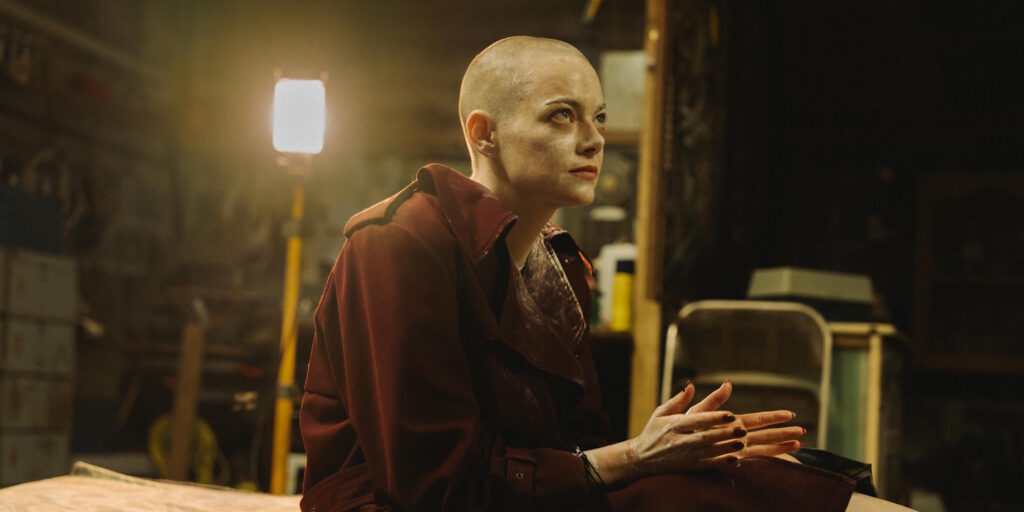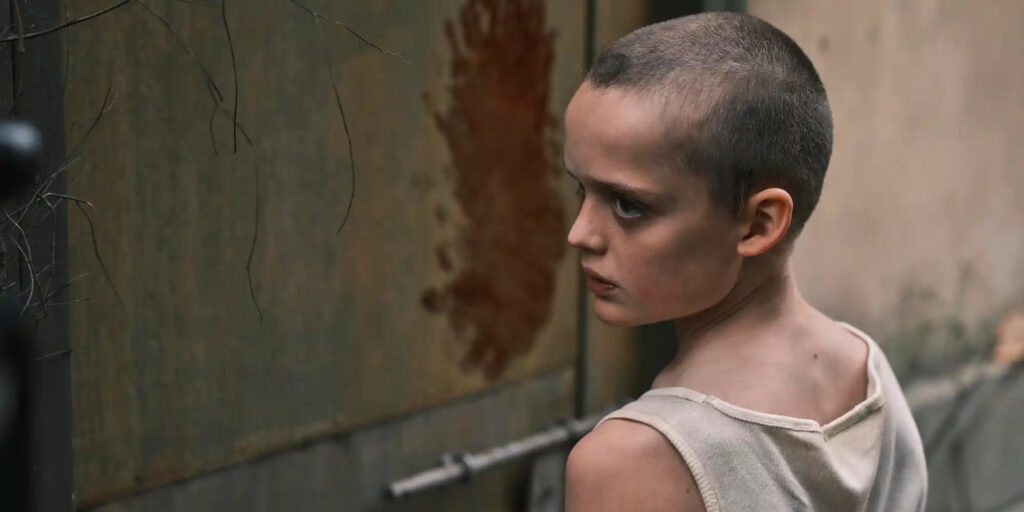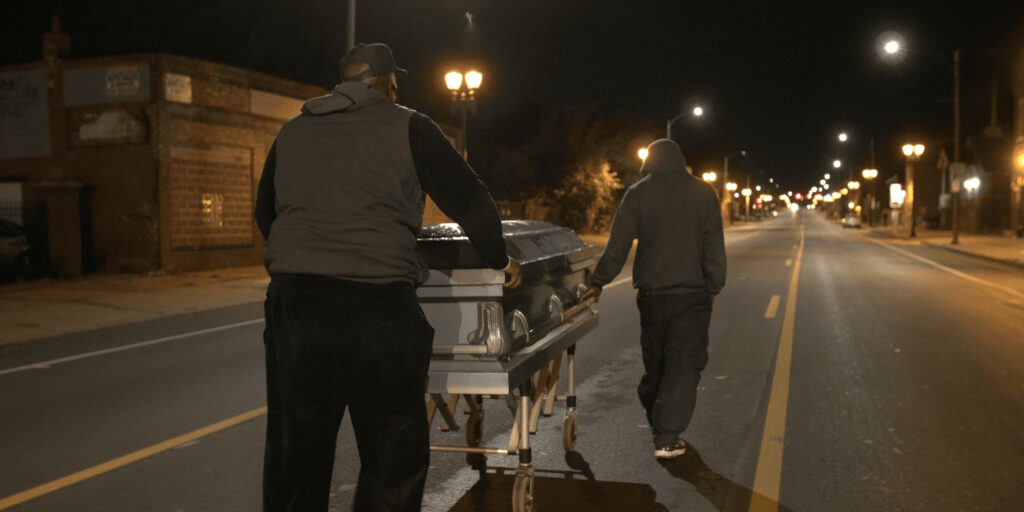Death often shadows Wes Anderson’s characters. His films are populated with widowers, orphans, and adult children who haven’t quite figured out how to move on from a parent’s passing. Consider how the figurative ghost of his late mother’s expectations haunts Max Fischer’s over-achieving exertions in Rushmore (1998). Or the way that the gruesome death of Steve Zissou’s best friend fuels his Ahab-like oceanographic obsession in The Life Aquatic (2004). Or the fact that the entire story in The Darjeeling Limited (2007) is propelled by the Whitman brothers’ struggle to metaphorically (and literally) let go of the baggage they inherited from their deceased father.
In this and other respects, war photographer and recent widower Augie Steenbeck (Jason Schwartzman) is an archetypal Anderson character. It is 1955, and Augie’s wife passed away some three weeks ago after a long hospitalization. However, he hasn’t yet worked up the courage to reveal this to his science-prodigy adolescent son Woodrow (Jake Ryan) or his precocious triplet daughters (Ella, Gracie, and Willan Faris). Augie is pressured to finally break the grim news when the family car breaks down in the flyspeck desert town of Asteroid City, where Woodrow is one of five nominated “Junior Stargazers” slated to receive a corporate-backed government scholarship. “I’m trying to find the right time,” Augie explains over the phone to his late wife’s crotchety, new-money father, Stanley Zak (Tom Hanks). “It’s always the wrong time,” is Stanley’s gruff but not-unsympathetic reply.
Augie is the closest thing to a protagonist in the sprawling ensemble of Anderson’s dizzyingly ambitious new feature, Asteroid City, but the film’s fascination with the riddle of oblivion extends far beyond one man’s private grief. Notwithstanding its striking Kodachrome palette – which lends Augie’s tale the look of a faded 1950s postcard – the director’s latest effort is actually a deadpan rumination on existential terror, in all its forms. How do we keep putting one foot in front of the other when the cosmos opens its hungry maw and reveals the insignificance of our sad little earthbound lives? If this sounds uncharacteristically grim coming from the filmmaker of Moonrise Kingdom (2012), have no fear. Despite the two animated features in Anderson’s filmography, Asteroid City is the closest the director has ever come to capturing the manic, hyperbolic comic sensibility of a Chuck Jones cartoon (complete with “Duck Amuck”-style meta hijinks).
Indeed, “meta” perhaps undersells the ecstatic conceptual audacity of Asteroid City, which in hindsight makes the elegant matryoshka narrative of The Grand Budapest Hotel (2014) look like a dry run. It’s not incidental that the new film’s title is styled with quotation marks, given that “Asteroid City” is a fiction within a fiction within a fiction. Follow along closely, if you can: Bryan Cranston portrays the unnamed, Rod Serling-like host of an Eisenhower-era live television anthology in the mold of Studio One (1948-58) or Playhouse 90 (1956-61). Said series is airing a behind-the-scenes dramatization of the first and only production of Asteroid City, an ill-fated show by prestigious American playwright Conrad Earp (Edward Norton). Another layer down from this black-and-white televised drama about the never-staged play Asteroid City lies “Asteroid City”, the widescreen Technicolor movie, which seems to exist in the mind’s eye of the play’s cast and crew (or perhaps simply Anderson himself).
It’s an undeniably convoluted premise on paper, and even more convoluted in practice. In contrast to Grand Budapest, where the nested-fiction conceit was expressed primarily through narrative bookends, Anderson dips in and out of Asteroid City’s multiple layers with fearless brio. Aspect ratio, color, grain, and other textural signifiers serve as landmarks for each level, but the film moves at such a zany, hyper-intellectual pace that some disorientation seems by design. The viewer can be forgiven for needing a few moments to grok which Jason Schwartzman they’re seeing in any given scene: Augie Steenbeck the widowed photographer, “Augie Steenbeck” the character in Earp’s play, Jones Hall the actor portraying Augie in the play, “Jones Hall” the character in the television show about the play, or the unnamed television actor portraying Hall. (To this list one could also add Schwartzman himself, the real-life actor playing all five characters.)
Asteroid City’s overlapping strata of artifice have a purpose beyond complexity for the sake of complexity, however. Characters on every level of Anderson’s dazzling, multi-tiered tale rely on art as a means of dealing with their private pain and mortal terror. The film makes a point of clarifying that acting, writing, music, and other artistic endeavors do not unlock some kind of cosmic enlightenment, or even guarantee satisfying answers. As Schwartzman’s actor repeatedly frets, almost pleadingly, to anyone who will listen, “I don’t understand the play.” Jones is vexed by the mystery of Augie’s senseless actions in a particular scene, an anxiety that echoes the way that so many characters in Asteroid City are confounded by a universe they can’t explain. How do we carry on with the day-to-day bullshit of life after a devastating loss or a paradigm-shattering revelation? Anderson’s feature posits that creative pursuits might not offer a solution to the puzzle of existence, but that the search for artistic truth (much like love) can be ennobling, empowering, and fulfilling.
Not that the sciences represent some soulless endeavor in Anderson’s conception. Indeed, Asteroid City is the filmmaker’s most gleefully geeky feature to date, conveying a gee-whiz mid-century fascination with futurism via a Looney Tunes caricature of the era’s technology. (One of the kids has invented a literal death ray.) Woodrow and his fellow Junior Stargazers – played by Grace Edwards, Ethan Josh Lee, Sophia Lillis, and Aristou Meehan – are disaffected wunderkinds in the classic Anderson style, but their congregation in the desert sparks the kind of charming energy that only materializes when teenagers finally find their people. Asteroid City’s resident astrophysicist Dr. Hickenlooper (Tilda Swinton) also sees a kindred spirit in the kids, although her high-powered radio telescope finds stiff competition for Woodrow’s attention once his maybe-romance with fellow Stargazer Dinah (Edwards) begins to blossom.
Dinah, it turns out, is the daughter of Hollywood star Midge Campbell (Scarlett Johansson), who has settled into the motor-court bungalow across from Augie and strikes up a charged situationship with him. Midge is ruthlessly devoted to her craft – as is Mercedes Ford, the stage actress portraying her – but her career has been stymied by poor taste in men and a studio system that can’t see past her sex-symbol status. She spends the blazing-hot desert afternoons running lines from screenplays and trading lonely-soul repartee with Augie as he develops his photographs in an ad hoc darkroom. Their flirtation continues even after an astonishing close encounter disrupts the Stargazers awards ceremony and the military places the town under a weeklong quarantine. Everything is different, and yet nothing really changes. Mushroom clouds from local atomic tests sprout on the horizon, but the lunch special is still served daily at the Asteroid City diner.
In a pivotal scene re-creating a fateful meeting between “Asteroid City”’s performers, director, and playwright, a Lee Strasberg-esque acting teacher (Willem Dafoe) directs his student to repeat a mantra: You can’t wake up if you don’t fall asleep. It’s a cryptic phrase, admittedly, but Anderson’s intricate and boundlessly revelatory film points towards at least two colorable readings (although it could doubtlessly support more). Firstly, living a fulfilling, purposeful life requires that we reckon with – rather than willfully disregard – the awful absurdity of mortality and the unfathomable vastness of the cosmos. Secondly, the fumbling search for artistic truth demands a fearless, ego-negating descent into lies, and sometimes even lies within lies. Yet Asteroid City proffers this not as some dirty, perverse secret of the creative life, but as a bottomless source of wonder, one that can set even the most jaded artist vibrating with the exhilaration of discovery.
Asteroid City opens is now playing theatrically in select cities and opens locally on Friday, June 23.




